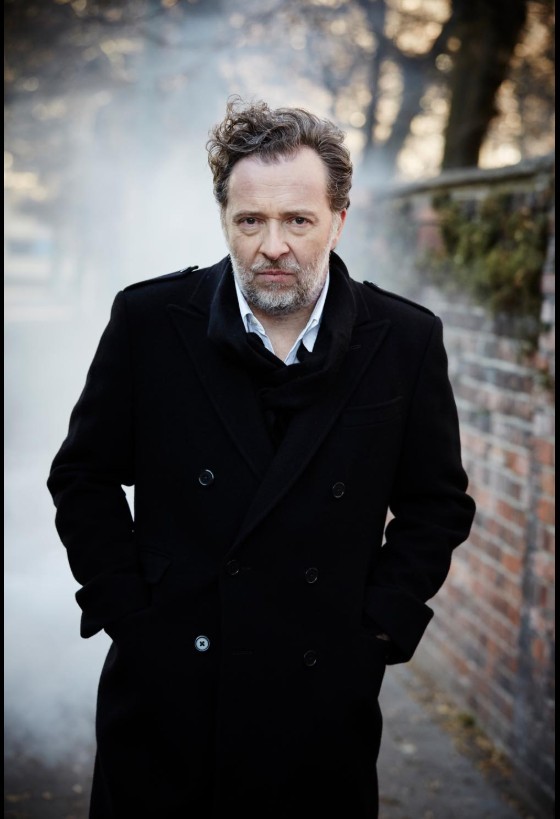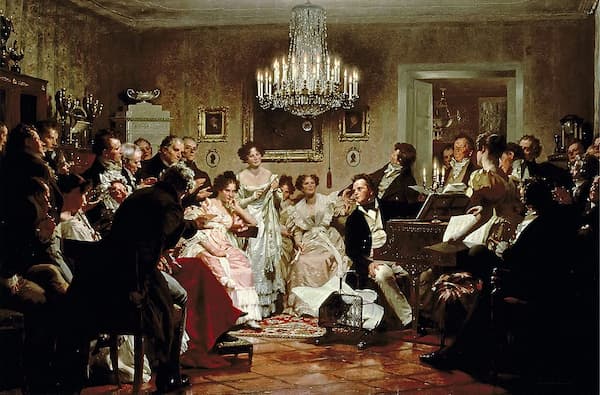Nestled in the picturesque region of Vorarlberg, Austria, the charming town of Hohenems once again hosts the renowned Schubertiade from July 10 to 14, 2025. This celebrated festival, a pinnacle of musical excellence for nearly 50 years, invites audiences to immerse themselves in a meticulously curated program that celebrates the enduring legacy of Franz Schubert.
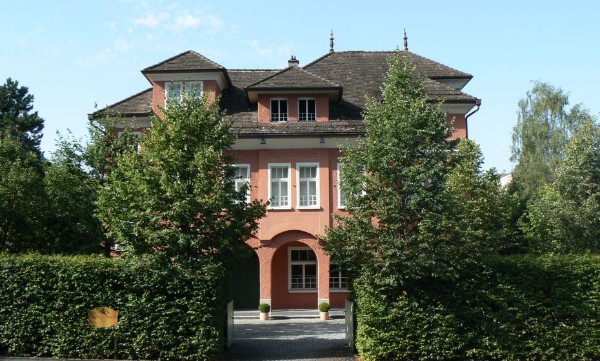
Schubertiade Hohenems
Weaving together an extraordinary tapestry of works by Schubert, Brahms, Schumann, Beethoven, Grieg, Rachmaninoff, and a contemporary composition by Hanna Kulenty, the 2025 programme features vocal cycles, chamber music, vocal quartets, and works for piano that promise a profound exploration of human emotion, poetic depth, and musical innovation, performed by some of the world’s finest artists.
Interlude will be on site, so please check often for updates, interviews, concert reviews, and festival-related activities. So, let’s get started with a short preview of some of the highlights on offer.
Franz Schubert: Rondo in A Major, D. 951
Schubert’s Soulful Canvas

Wilhelm August Rieder: Portrait of Franz Schubert, 1875
Unsurprisingly, Franz Schubert’s music forms the emotional and artistic core of the festival, showcasing his unparalleled ability to weave lyrical intimacy with profound structural innovation. As such, Winterreise stands as a pinnacle of the lieder tradition, its 24 songs tracing a psychological odyssey through desolation and unrequited love. Schubert’s setting of Müller’s poetry transforms the wanderer’s journey into a universal meditation on loss and alienation, with stark harmonic shifts and melodic restraint amplifying the bleakness of the text.
The cycle’s tonal ambiguity, which oscillates between minor keys and fleeting moments of hope that mirror the protagonist’s inner turmoil, evokes the relentless tread through a frozen landscape. In the intimate setting of the Markus-Sittikus Hall in Hohenems, Winterreise will unfold as a profound ritual, its raw emotional depth inviting listeners to confront the universal themes of loss, alienation, and the search for meaning in a seemingly indifferent world.
Franz Schubert: Winterreise, D. 911 “Gute Nacht”
Poetic Solitude and Collaborative Joy
The introspective power of Winterreise, balancing expressivity with the austere beauty of Schubert’s musical architecture, emerges equally compelling in the instrumental and chamber offerings of the Hohenems July 2025 Schubertiade. The featured Piano sonatas reveal Schubert’s evolution as a composer, from the youthful exuberance of D. 566’s lyrical charm to D. 894’s expansive, almost symphonic scope. D. 575, with its bold modulations and restless energy, bridges these extremes, showcasing Schubert’s ability to infuse classical forms with Romantic spontaneity.
The featured chamber works include the Piano Trio in E-flat Major, D. 929 and Notturno, D. 897, compositions that further highlight Schubert’s gift for dialogue and contrast by blending soaring melodies with intricate interplay. The Eight Variations on an Original Theme, D. 813 and Rondo in A Major, D. 951 for piano four hands exude a convivial warmth, their playful virtuosity reflecting the communal spirit of Schubert’s Viennese gatherings. Together, these compositions underscore Schubert’s genius for transforming personal expression into universal resonance, making them a fitting centrepiece for the Schubertiade’s exploration of the human spirit.
Franz Schubert: Piano Sonata in B-Major, K. 575 (William Youn, piano)
Hidden Gems
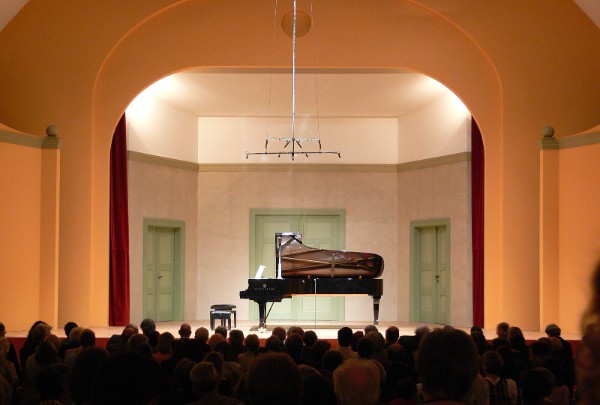
Markus Sittikus Hall, Hohenems
Of particular interest for connoisseurs of music are the lesser-known but deeply expressive “Quartette for Four Male Voices.” Composed between 1812 and 1820, these intimate and conversational works showcase Schubert’s unparalleled gift for melody and his sensitivity to text, blending the convivial spirit of the Viennese Liedertafel tradition with his signature emotional depth.
Written for amateur male singing groups, a popular format in early 19th-century Vienna, these quartets range from jovial drinking songs to poignant reflections on nature, love, and mortality. The simplicity of the medium, featuring four voices, often unaccompanied or with minimal piano support, belies the sophistication of Schubert’s writing, which balances lyrical elegance with moments of striking chromaticism.
What makes these quartets particularly engaging is their ability to transport listeners to the intimate, candlelit gatherings of Schubert’s time, where friends would sing together in homes or taverns, weaving music and poetry into their social fabric. Schubert’s genius lies in his ability to elevate these seemingly modest works into profound musical statements, capturing universal human experiences with a directness that resonates across centuries.
Franz Schubert: “Grab und Mond,” D. 893 (Christian Elsner, tenor; James Taylor, tenor; Franz-Josef Selig, bass; Michael Volle, baritone; Gerold Huber, piano)
Lyrical Passion
While the Schubertiade is primarily dedicated to the works of Franz Schubert, the July 2025 Hohenems edition features several evocative compositions by Robert Schumann, enriching the programme with romantic intensity and lyrical depth. Schumann’s music brings a complementary intensity, psychological complexity, and literary sophistication that creates a dynamic dialogue between two titans of Romanticism.
The July 2025 Hohenems Schubertiade will showcase a trio of Robert Schumann’s most cherished vocal works: Liederkreis, Op. 24, Dichterliebe, Op. 16, and Myrthen, Op. 25.
Composed in 1840 during Schumann’s “Year of Song”, the Liederkreis, Op. 24 sets nine poems by Heinrich Heine that capture a spectrum of emotions from restless yearning to tender resignation. This less-frequently performed cycle is a study in contrasts as anxious anticipation is juxtaposed by a serene and hopeful close.
Robert Schumann: Liederkreis, Op. 24 (Christian Gerhaher, baritone; Gerold Huber, piano)
Ecstasy and Death
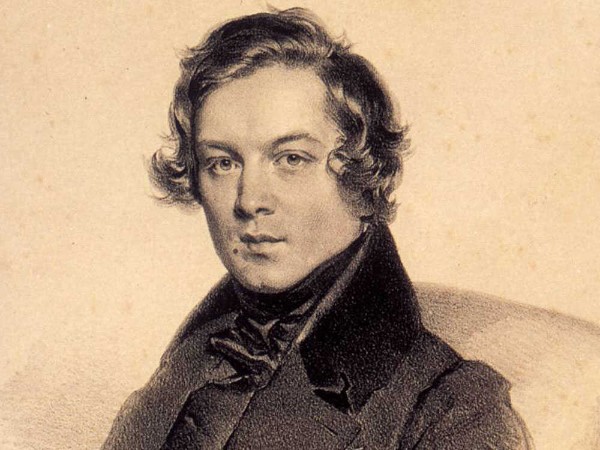
Robert Schumann
Dichterliebe, Op. 16, another Heine-inspired cycle from 1840, is among Schumann’s most celebrated works. It is a 16-song journey through love’s ecstasy, betrayal, and heartbreak. From tender longing to devastating irony, the cycle showcases Schumann’s ability to mirror the psychological depth of Heine’s poetry with soaring melodies and intricate piano textures. Balancing the cycle’s emotional volatility with its lyrical finesse fosters a profound connection between performers and the audience, further amplified by the festival’s intimate setting.
Also composed in 1840, Myrthen, Op. 25, was a wedding gift to Clara Schumann. It is a vibrant collection of 26 songs setting texts by poets like Rückert, Goethe, and Heine, celebrating love in its many facets. Notable for its eclectic textual sources, it represents a departure from the conventional notion of a song cycle as a unified narrative. The cycle’s diversity, ranging from exuberant passion to quiet introspection, offers performers a canvas to display both vocal brilliance and emotional depth.
Robert Schumann’s Lieder und Gesänge aus Goethes, “Wilhelm Meister” and the Romanzen und Balladen Op. 64 weave a spellbinding tapestry of poetic lyricism and narrative depth. The Meister cycle, inspired by Goethe’s novel, brings to life the enigmatic Mignon and the Harper through nine songs, while the Ballads offer vivid storytelling evoking longing and pride.
Robert Schumann: Romanzen und Balladen, Book 4, Op. 64 (Sibylla Rubens, soprano; Christian Gerhaher, baritone; Gerold Huber, piano)
Folk Roots and Timeless Resonance
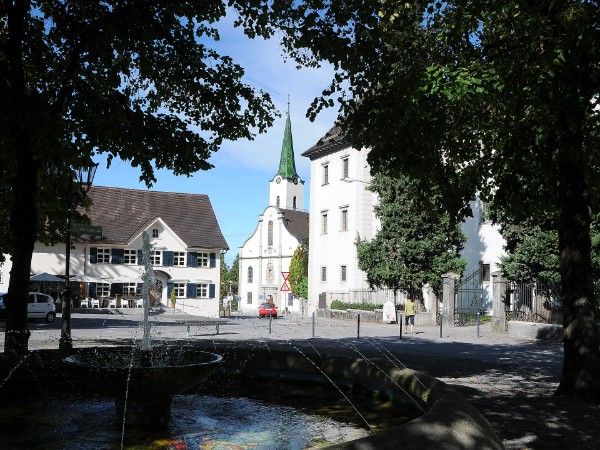
In the center of Hohenems
The July 2025 Hohenems Schubertiade also pays homage to the folk-inspired lyricism of Johannes Brahms with a selection of his Volkslieder. These songs, steeped in the traditions of German folk music, blend rustic simplicity with profound artistry. As Brahms wrote in 1894, “it is the first time that I regard with tenderness that, which I have produced.”
The Schubertiade Hohenems, a cornerstone of the world’s premier Schubert festival, will host its summer 2025 edition from July 10 to July 14 at the acoustically renowned Markus-Sittikus-Saal in Hohenems, Austria. This five-day event, part of the festival’s 50th anniversary season, continues its tradition of celebrating Franz Schubert’s music while also featuring works by his near contemporaries, and a special performance of Hanna Kulenty’s contemporary composition VAN…
The Festival promises a transformative experience combining intellectual stimulation, aesthetic beauty, and emotional profundity. Connecting world-class performances in an intimate setting, the Schubertiade Hohenems, offers a timeless message of hope and unity so urgently needed during these troubling times.
For more of the best in classical music, sign up for our E-Newsletter

